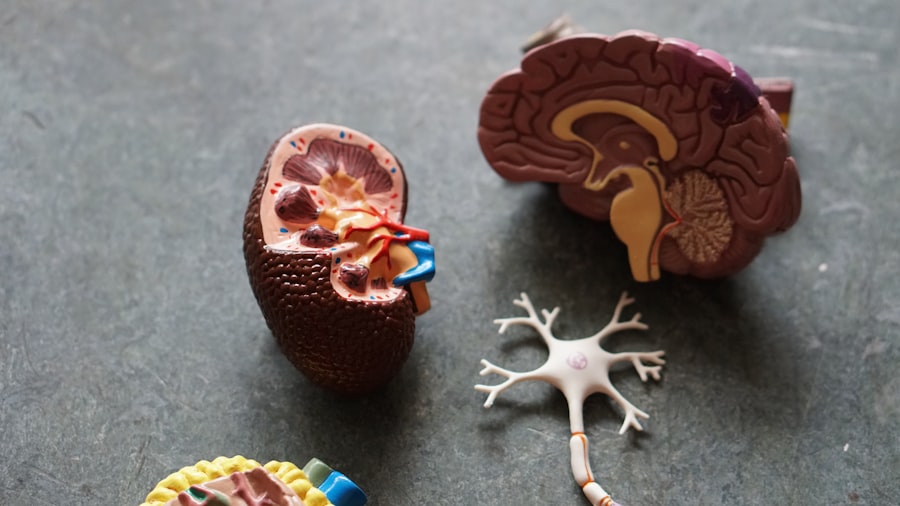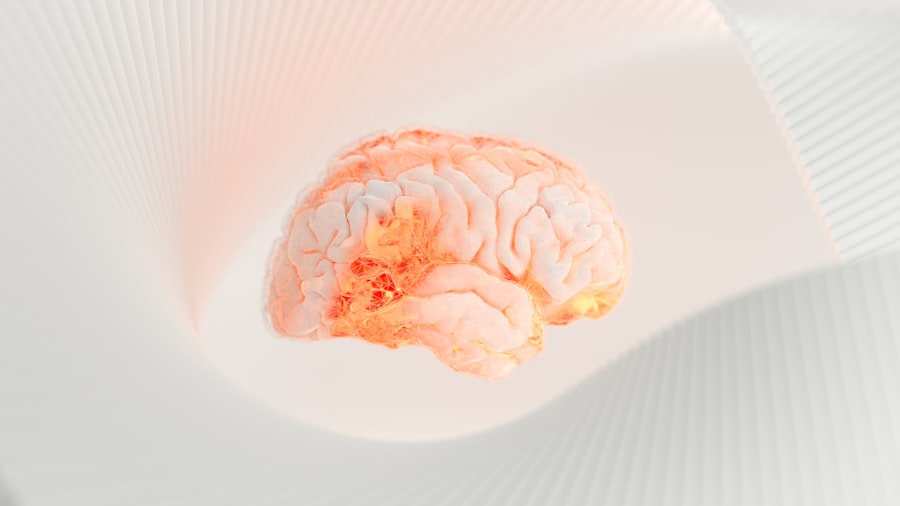Your brain is the command center of your body, orchestrating everything from your thoughts and emotions to your movements and bodily functions. As you navigate through life, maintaining optimal brain health becomes increasingly important. The brain is not only responsible for cognitive abilities but also plays a crucial role in your overall well-being.
Understanding how to support and enhance your brain health can lead to improved memory, better mood regulation, and a greater capacity for learning. In a world filled with distractions and stressors, prioritizing brain health is essential. You may often find yourself juggling multiple responsibilities, which can take a toll on your mental faculties.
By focusing on the various aspects that contribute to brain health, you can cultivate a lifestyle that promotes cognitive resilience and emotional stability. This article will explore the multifaceted nature of brain health, offering insights into how you can support your brain through nutrition, exercise, stress management, and more.
Key Takeaways
- Brain health is crucial for overall well-being and cognitive function
- Supporting brain structure is important for maintaining mental sharpness and preventing cognitive decline
- Nutritional support, exercise, stress management, and sleep are key factors in maintaining brain health
- Cognitive activities, social interaction, and environmental factors also play a role in supporting brain structure
- Herbal and supplement support can complement natural ways to support brain health
Importance of Supporting Brain Structure
Supporting the structure of your brain is fundamental to maintaining its functionality. The brain is composed of billions of neurons that communicate with each other through synapses. Over time, factors such as aging, stress, and poor lifestyle choices can lead to a decline in the integrity of these connections.
By actively working to support your brain’s structure, you can enhance its ability to process information and respond to challenges. One of the key aspects of supporting brain structure is ensuring that it receives adequate blood flow and oxygen. This is where lifestyle choices come into play.
Engaging in regular physical activity not only boosts circulation but also promotes the growth of new neurons—a process known as neurogenesis. By prioritizing activities that get your heart pumping, you can help maintain the structural integrity of your brain while also improving cognitive function.
Nutritional Support for Brain Health

Nutrition plays a pivotal role in supporting brain health. The foods you consume provide the essential nutrients that your brain needs to function optimally. A diet rich in antioxidants, healthy fats, vitamins, and minerals can help protect your brain from oxidative stress and inflammation, both of which can contribute to cognitive decline.
Incorporating foods such as fatty fish, berries, nuts, and leafy greens into your meals can provide the necessary building blocks for a healthy brain. Moreover, staying hydrated is equally important for cognitive function. Dehydration can lead to fatigue, confusion, and difficulty concentrating.
By ensuring that you drink enough water throughout the day, you can support your brain’s ability to perform at its best. Consider keeping a water bottle nearby as a reminder to stay hydrated and nourish your brain with the nutrients it craves.
Exercise and Brain Health
| Exercise Type | Frequency | Duration | Benefits |
|---|---|---|---|
| Aerobic Exercise | 3-5 times per week | 30-60 minutes | Improves memory and cognitive function |
| Strength Training | 2-3 times per week | 20-30 minutes | Enhances brain health and reduces risk of dementia |
| Yoga | 2-3 times per week | 45-60 minutes | Reduces stress and improves mental clarity |
Physical exercise is not just beneficial for your body; it has profound effects on your brain as well. When you engage in regular physical activity, you stimulate the release of various neurotrophic factors that promote the growth and survival of neurons. This means that exercise can enhance your brain’s plasticity—the ability to adapt and change in response to new experiences.
Incorporating aerobic exercises, such as running or swimming, into your routine can significantly boost cognitive function. These activities increase blood flow to the brain, delivering oxygen and nutrients that are vital for optimal performance. Additionally, strength training has been shown to improve memory and executive function.
By finding an exercise regimen that you enjoy, you can create a sustainable habit that supports both your physical and mental health.
Stress Management and Brain Health
Stress is an inevitable part of life, but how you manage it can have a significant impact on your brain health. Chronic stress can lead to structural changes in the brain, particularly in areas associated with memory and emotional regulation. Learning effective stress management techniques is crucial for protecting your cognitive abilities.
Mindfulness practices such as meditation and deep breathing exercises can help reduce stress levels and promote relaxation. By taking time each day to focus on your breath or engage in mindfulness meditation, you can create a sense of calm that benefits both your mind and body. Additionally, finding healthy outlets for stress—such as engaging in hobbies or spending time in nature—can further support your mental well-being.
Sleep and Brain Health

Sleep is often overlooked when it comes to maintaining brain health, yet it is one of the most critical factors influencing cognitive function. During sleep, your brain undergoes essential processes that help consolidate memories and clear out toxins that accumulate throughout the day. Insufficient sleep can lead to impaired cognitive performance, mood disturbances, and increased risk of neurodegenerative diseases.
To support your brain health through sleep, aim for 7-9 hours of quality rest each night. Establishing a consistent sleep schedule can help regulate your body’s internal clock, making it easier to fall asleep and wake up feeling refreshed. Creating a calming bedtime routine—such as reading or practicing relaxation techniques—can also signal to your body that it’s time to wind down.
Cognitive Activities for Brain Health
Engaging in cognitive activities is another effective way to support your brain health. Just as physical exercise strengthens your muscles, mental exercises can enhance cognitive function and promote neuroplasticity. Activities such as puzzles, reading, learning a new language, or playing musical instruments challenge your brain and encourage the formation of new neural connections.
Consider setting aside time each week to engage in activities that stimulate your mind. Whether it’s joining a book club or taking up a new hobby, finding ways to challenge yourself intellectually can keep your brain sharp as you age. Additionally, incorporating variety into these activities can further enhance their benefits by exposing your brain to new experiences.
Social Interaction and Brain Health
Social interaction is not only enjoyable but also vital for maintaining brain health. Engaging with others stimulates cognitive processes such as communication, empathy, and problem-solving. Studies have shown that individuals who maintain strong social connections tend to experience slower cognitive decline compared to those who are more isolated.
Make an effort to nurture your relationships with family and friends by scheduling regular catch-ups or participating in group activities.
By fostering meaningful connections with others, you not only enrich your life but also support your brain’s health.
Environmental Factors and Brain Health
Your environment plays a significant role in shaping your brain health. Factors such as exposure to toxins, noise pollution, and even the aesthetics of your surroundings can influence cognitive function and emotional well-being. Creating a healthy living space that promotes relaxation and focus can have lasting effects on your mental state.
Consider decluttering your home or workspace to reduce distractions and create a more serene atmosphere. Incorporating elements of nature—such as plants or natural light—can also enhance mood and cognitive performance. By being mindful of your environment and making adjustments where necessary, you can create a space that supports both mental clarity and emotional balance.
Herbal and Supplement Support for Brain Health
In addition to lifestyle changes, certain herbs and supplements may offer additional support for brain health. Ingredients like omega-3 fatty acids found in fish oil have been linked to improved cognitive function and reduced risk of neurodegenerative diseases. Other supplements such as ginkgo biloba and bacopa monnieri are believed to enhance memory and concentration.
Before incorporating any new supplements into your routine, it’s essential to consult with a healthcare professional to ensure they are appropriate for you. They can provide guidance on dosages and potential interactions with other medications you may be taking. By combining natural supplements with a healthy lifestyle, you can create a comprehensive approach to supporting your brain health.
Conclusion and Recap of Natural Ways to Support Brain Structure
In conclusion, supporting your brain health is an ongoing journey that encompasses various aspects of your lifestyle. From nutrition and exercise to stress management and social interaction, each element plays a vital role in maintaining cognitive function and emotional well-being. By prioritizing these natural approaches—such as engaging in regular physical activity, consuming nutrient-rich foods, managing stress effectively, ensuring quality sleep, participating in cognitive activities, nurturing social connections, creating a supportive environment, and considering herbal supplements—you can cultivate a resilient mind capable of thriving throughout life.
As you embark on this journey toward better brain health, remember that small changes can lead to significant improvements over time. By being proactive about supporting your brain structure today, you are investing in a brighter future filled with clarity, creativity, and emotional balance. Embrace these strategies as part of your daily routine, and watch as they transform not only your cognitive abilities but also your overall quality of life.
In exploring natural ways to support brain structure, it’s essential to consider various lifestyle and dietary approaches that can contribute to cognitive health. One related article that delves into this topic can be found on the Explore Senior Health website. This resource provides valuable insights into maintaining brain health through natural means, such as incorporating specific nutrients and engaging in mental exercises. For more detailed information, you can read the article by visiting Explore Senior Health.
WATCH THIS! 🧠 Stop Senior Moments: The Golden Spice That Reverses Memory Loss
FAQs
What are natural ways to support brain structure?
Some natural ways to support brain structure include getting regular exercise, eating a healthy diet rich in antioxidants and omega-3 fatty acids, getting enough sleep, managing stress, and engaging in activities that stimulate the brain, such as puzzles and learning new skills.
How does exercise support brain structure?
Regular exercise can support brain structure by increasing blood flow to the brain, promoting the growth of new brain cells, and improving overall brain function. It can also help reduce the risk of age-related cognitive decline.
What role does diet play in supporting brain structure?
A healthy diet rich in antioxidants, such as fruits and vegetables, and omega-3 fatty acids, found in fish and nuts, can support brain structure by reducing inflammation and oxidative stress, which can damage brain cells. These nutrients also support overall brain health and function.
How does sleep support brain structure?
Getting enough quality sleep is important for supporting brain structure, as it allows the brain to rest and repair itself. During sleep, the brain consolidates memories and clears out toxins that can build up during the day.
How does managing stress support brain structure?
Chronic stress can have a negative impact on brain structure, so managing stress through techniques such as meditation, deep breathing, and mindfulness can help support brain health. Reducing stress can also improve overall mental well-being.
What activities can support brain structure?
Engaging in activities that stimulate the brain, such as puzzles, reading, learning new skills, and socializing, can support brain structure by promoting the growth of new brain cells and strengthening neural connections. These activities can also help maintain cognitive function as we age.
